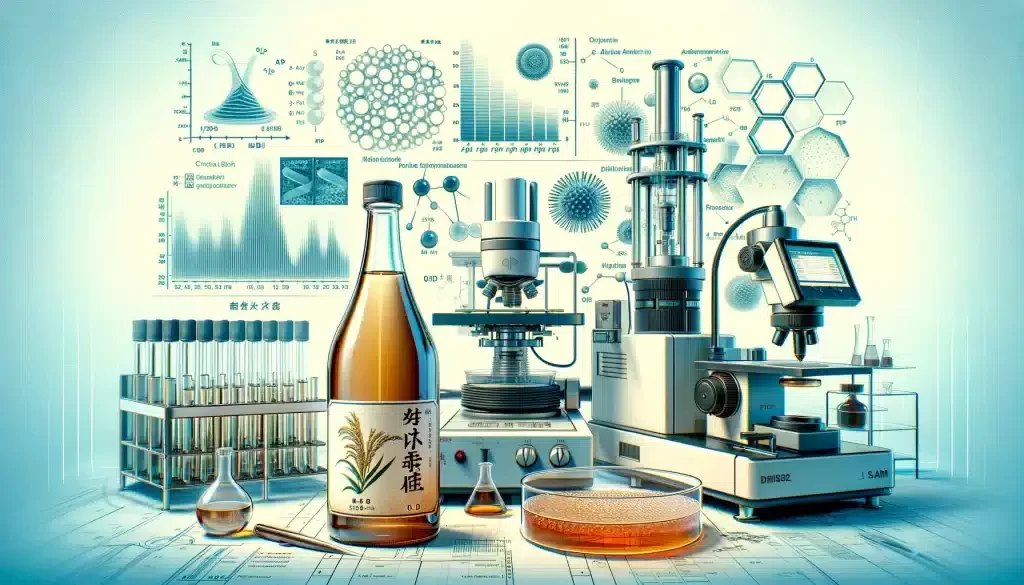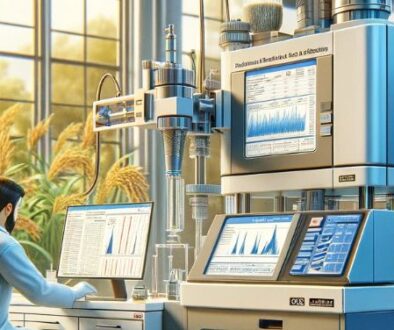Analysis Of Protein Composition Of Bottled Rice Wine And Separation And Purification Of Its Main Components
Exploring protein composition in rice wine using 2-DE and MALDI-TOF-MS to improve clarity and quality by analyzing α-amylase inhibitor 0.19.
Abstract In order to study the protein composition in bottled rice wine and purify its main components, two-dimensional electrophoresis (2-DE) and matrix-assisted laser desorption/ionization time-of-flight tandem mass spectrometry (matrix-assisted laser desorption/ionization time-of-flight) were used. -flight mass spectrometry, MALDI-TOF-MS) analyzed the protein composition of bottled rice wine and purified ¦Á-amylase inhibitor 0.19; the proteins in bottled Shaoxing rice wine mainly include ¦Á-amylase inhibitor 0.19 derived from wheat and oat-like protein. and disease course-related proteins, as well as the allergenic protein RAG2 and ¦Á-amylase/trypsin inhibitor RA16 derived from rice seeds. The purified ¦Á-amylase inhibitor 0.19 was detected by SDS-PAGE and a molecular mass of 13.7 kDa was obtained. Protein bands; Bottled rice wine only contains wheat and rice proteins, and ¦Á-amylase inhibitor 0.19 has the largest number of protein spots, which is the main component of bottled Shaoxing rice wine protein. Study the structural characteristics of protein and its effect on the formation of turbidity in rice wine. The impact can provide a theoretical basis for solving the turbidity problem
Introduction to Analytical Techniques in Rice Wine Research
In recent research aimed at enhancing our understanding of the protein composition in bottled rice wine and its effects on product quality, particularly in terms of clarity, innovative analytical techniques were employed to dissect the protein framework and purify essential components. This study leverages the precision of two-dimensional electrophoresis (2-DE) along with the advanced capabilities of matrix-assisted laser desorption/ionization time-of-flight tandem mass spectrometry (MALDI-TOF-MS). These methodologies offer a detailed analysis of the protein constituents in bottled rice wine, with a special focus on the purification of α-amylase inhibitor 0.19.
Identification of Protein Composition in Bottled Rice Wine
The findings from the study revealed that the protein composition in bottled Shaoxing rice wine is predominantly characterized by α-amylase inhibitor 0.19, which primarily originates from wheat. Additionally, the presence of oat-like protein, disease course-related proteins, the allergenic protein RAG2, and α-amylase/trypsin inhibitor RA16 derived from rice seeds was noted. These proteins contribute to the unique protein matrix of bottled rice wine, influencing both its taste and physicochemical properties.
Purification and Analysis of α-Amylase Inhibitor 0.19
α-Amylase inhibitor 0.19 stands out due to its significant presence, highlighted by the largest number of protein spots in the analyzed samples. This inhibitor was further scrutinized through SDS-PAGE analysis, revealing a molecular mass of 13.7 kDa. The study’s emphasis on α-amylase inhibitor 0.19 stems from its pivotal role in the protein composition of bottled Shaoxing rice wine, indicating its influence on the wine’s quality and stability.
Exploring the Impact of Protein Composition on Turbidity
The research extends beyond mere identification of protein components; it delves into understanding the structural characteristics of these proteins and their potential impact on the formation of turbidity in rice wine. Turbidity, or cloudiness, poses a significant quality concern in rice wine production, affecting its aesthetic appeal and marketability. By exploring the relationship between protein composition, particularly the abundance of α-amylase inhibitor 0.19, and turbidity formation, this study aims to provide a solid theoretical foundation for addressing this challenge.
Advancements in Proteomic Analysis for Food Science
The application of MALDI-TOF-MS in conjunction with 2-DE for protein analysis in food science represents a substantial advancement in our capability to identify and quantify minute protein constituents in complex mixtures like rice wine. These techniques allow for a more nuanced understanding of the role of specific proteins in the sensory and physical attributes of food products.
Implications for Rice Wine Quality Improvement and Production
This research contributes to the broader field of food science by offering insights into how protein compositions affect the quality of fermented beverages. The purification and detailed analysis of α-amylase inhibitor 0.19 open new avenues for improving rice wine production processes. By mitigating the factors that contribute to turbidity, producers can enhance the clarity and overall quality of bottled rice wine, meeting consumer expectations for premium products. This study not only addresses specific challenges in rice wine production but also sets a precedent for utilizing advanced proteomic techniques in the analysis and improvement of food and beverage products.
For futher details of this article and research, feel free to contact our team for assistance.
Original research was done by Sun Junyong, Xie Guangfa, Lu Jian, Qi Xiaohui
About ETprotein:
ETprotein, a reputable plant protein vegan protein Chinese factory manufacturer and supplier, is renowned for producing, stocking, exporting, and delivering the highest quality organic bulk vegan protein and plant proteins. They include Organic rice protein, clear rice protein, pea protein, clear pea protein, oat protein, watermelon seed protein, pumpkin seed protein, sunflower seed protein, mung bean protein, peanut protein, various of plant peptides etc. Their offerings, characterized by a neutral taste, non-GMO, allergen-free attributes, cater to a diverse range of industries. They serve nutraceutical, pharmaceutical, cosmeceutical, veterinary, as well as food and beverage finished product distributors, traders, and manufacturers across Europe, USA, Canada, Australia, Thailand, Japan, Korea, Brazil, and Chile, among others.
ETprotein specialization includes exporting and delivering tailor-made protein powder and finished nutritional supplements. Their extensive product range covers sectors like Food and Beverage, Sports Nutrition, Weight Management, Dietary Supplements, Health and Wellness Products, and Infant Formula, ensuring comprehensive solutions to meet all your protein needs.
As a trusted company by leading global food and beverage brands and Fortune 500 companies, ETprotein reinforces China’s reputation in the global arena. For more information or to get a free sample of their protein products, please contact them and email sales(at)ETprotein.com today.












